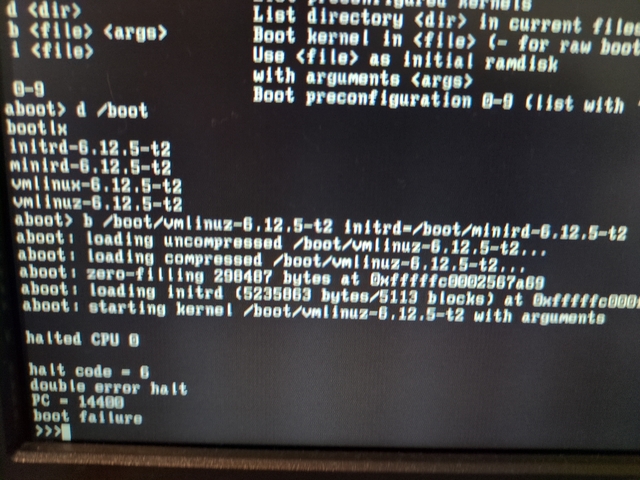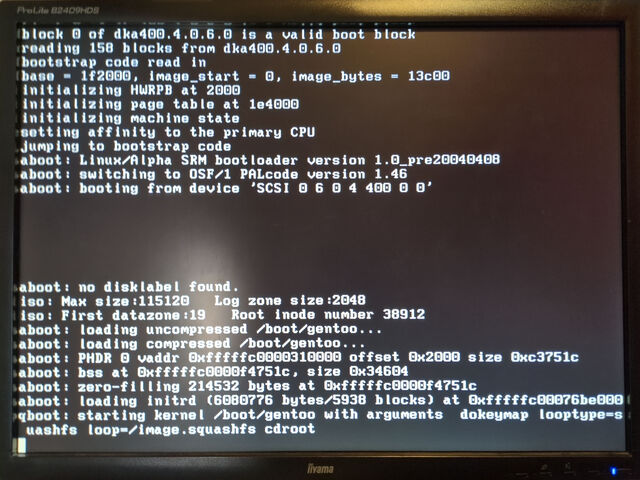Digital AlphaStation 250 4/266 — Part 2
Previous:
In part one we had a look at the hardware and check if it was still working. Now let’s have a look at the software side.
Original OS
When buying this workstation, you had a choice between 3 different operating systems:
- DEC OSF/1;
- OpenVMS;
- Microsoft Windows NT Workstation.
On those 3, only OpenVMS still exists, but I don’t think it still supports this AlphaStation.
I want to run a supported open source operating system, still supporting the Alpha architecture.
Contenders
The Linux kernel still supports Alpha processors.
Debian
Unfortunately my favorite linux distribution, Debian, dropped its support in version 6.
T2 SDE
I’m interested into trying T2 SDE but the installation ISO is over 900 MB, so I can’t burn it on a CD. I can burn it on a USB key but the AlphaStation doesn’t have any USB port. The other solution is to create my own T2 SDE image:
sudo apt install bison file flex gawk libncurses-dev lzip make rsync subversion texinfo time
svn co https://svn.exactcode.de/t2/tags/25.4 t2
cd t2
./t2 config
- Target Distribution:
-- generic
-- base
-- install
- Architecture, CPU and Optimization:
-- alpha
-- ev45
-- disable software floating point
-- enable link time optimization
-- enable this is a cross-build between architectures
# Left the rest as is.
./t2 download -required
sudo ./t2 build-target
And of course the build failed. So that’s a no-go.
Update: at some point (see next post 😉) I did manage to boot the ISO, but it crashed while loading the Linux kernel.
Gentoo
Gentoo still supports Alpha processors but requires 256 MB of memory. Anyway, let’s give it a try.
It starts with burning the ISO image onto a CD-ROM:
# Download the image, hash and signature:
$ wget http://ftp.free.fr/mirrors/ftp.gentoo.org/releases/alpha/autobuilds/current-install-alpha-minimal/install-alpha-minimal-20250424T165014Z.iso
$ wget http://ftp.free.fr/mirrors/ftp.gentoo.org/releases/alpha/autobuilds/current-install-alpha-minimal/install-alpha-minimal-20250424T165014Z.iso.asc
$ wget http://ftp.free.fr/mirrors/ftp.gentoo.org/releases/alpha/autobuilds/current-install-alpha-minimal/install-alpha-minimal-20250424T165014Z.iso.sha256
# Check the hash:
$ sha256sum --check install-alpha-minimal-20250424T165014Z.iso.sha256
install-alpha-minimal-20250424T165014Z.iso: OK
# Download the Gentoo public key:
$ gpg --keyserver hkps://keys.gentoo.org --recv-keys 13EBBDBEDE7A12775DFDB1BABB572E0E2D182910
gpg: Note: signatures using the SHA1 algorithm are rejected
gpg: key BB572E0E2D182910: 5 bad signatures
gpg: key BB572E0E2D182910: public key "Gentoo Linux Release Engineering (Automated Weekly Release Key) <releng@gentoo.org>" imported
gpg: Total number processed: 1
gpg: imported: 1
# Check the image signature:
$ gpg --verify install-alpha-minimal-20250424T165014Z.iso.asc
gpg: assuming signed data in 'install-alpha-minimal-20250424T165014Z.iso'
gpg: Signature made ven. 25 avril 2025 05:21:06 CEST
gpg: using RSA key 534E4209AB49EEE1C19D96162C44695DB9F6043D
gpg: Note: signatures using the SHA1 algorithm are rejected
gpg: Good signature from "Gentoo Linux Release Engineering (Automated Weekly Release Key) <releng@gentoo.org>" [unknown]
gpg: WARNING: This key is not certified with a trusted signature!
gpg: There is no indication that the signature belongs to the owner.
Primary key fingerprint: 13EB BDBE DE7A 1277 5DFD B1BA BB57 2E0E 2D18 2910
Subkey fingerprint: 534E 4209 AB49 EEE1 C19D 9616 2C44 695D B9F6 043D
Burn the image on a CD, then on the AlphaStation at boot time, in SRM, show config shows a device called RRD43 attached as dka400 on the SCSI controller.
The RRD43 is the CD-ROM Disc Drive from Digital.
To boot on it, I typed boot dka400 to boot on the CD Drive.
And of course it’s not working, complaining that the drive has no media present. I burned the installation image on a CD-RW, and old drives like this one may have issues with that kind of disc. CD-RW where invented in 1997, so at least 2 years after the CD drive was made.
Just to make sure I inserted an original installation CD of Windows 2000, typed boot dka400 and got “block 0 of dka400.4.0.6.0 is not a valid boot block”.
Progress!
The drive seems to work.
Let’s burn a CD-R instead of a CD-RW.
Typed boot dka400 again… and it worked!
…but not for long. The boot froze when starting the kernel 🙁.
My guess is that Gentoo and T2 target a more recent version of the Alpha processor architecture.
OpenBSD
Linux is failing me here. Let’s try the BSD side of Unix.
I did use OpenBSD at some point in the past and OpenBSD still supports the AlphaStation 250. This guy has a working AlphaStation just like mine and runs OpenBSD on it.
Again, download the image, burn it, boot on it… Installation script starts, just answer the questions:
System hostname = alpha
Network interface to configure = de0
IPv4 address for de0 = autoconf
IPv6 address for de0 = none
Network interface to configure = done
Start sshd(8) by default = yes
Run X Window = no # X is broken on OpenBSD’s Alpha port at the moment.
Change the default console to com0 = no
Setup a user = xxx
Full name for user laurent = xxx
Allow root ssh login = no
What timezone are you in = Europe/Paris
Which disk is the root disk = sd0
Use (A)uto layout, (E)dit auto layout, or create (C)ustom layout = c # Custom, use `a` for auto layout, but it splits things in plenty of partitions, let’s keep it simple with just a big one for now.
a b # Add `b` partition for swap.
offset: 0
size: 1g
fs type: swap
a a # Add root partition.
offset: enter
size: enter
fs type: 4.2BSD
mount point: /
w # Write changes.
q # Quit.
Location of sets = cd0
Pathname to the sets = 7.6/alpha
Set name(s) = -x* # No need for X-Window packages.
Set name(s) = -game*
Set name(s) = done
Directory does not contain SHA256.sig. Continue without verification = yes
Location of sets = done
Time appears wrong. Set to **now** = yes
# There’s a step of relinking the kernel that took about 8 minutes.
Exit: halt # Selecting reboot here will reboot on the CD drive.
>>> boot
The boot time is slightly long. There’s a step where symbols of libs are randomized then relinked to the libc. When the patch was commited, the person who wrote it said: “The cost is less than a second on the systems I am using”. Yeah, well, we are not using the same system, it took at least 5 minutes for that step on the AlphaStation. Also on first boot the SSH keys are created, that took a while too, but that’s only this one time. That first boot took a bit more than 11 minutes…
Interestingly, during boot, there was again a warning message about the date being wrong, and some other errors that seem to be related to the hard drive.
But once booted up, I could still hear the disk working hard for at least 5 more minutes.
Remember, when going to work, you turned the computer on then went to have your morning coffee? Welcome back to the past, here is the full 15 minutes boot sequence until relinking is finished:
It was plugged into my network, so now I can see it appears in my router:
And I can connect to it through SSH 👍.
Note that the Alpha architecture is not supported as well as some other architectures. Packages are not available and installing software has to be done through ports which basically mean compiling the software… which is going to be a lot of fun on a so powerful machine…
Next:



